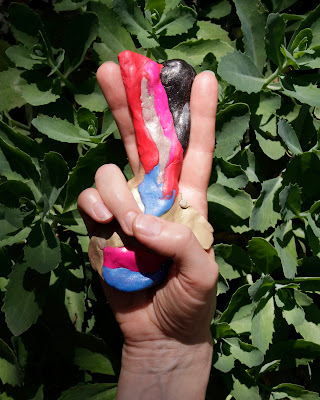past exhibition
Fixers: A Trauma Revival
Sarah Petersen
06.22.19 - 07.14.19
Performative activations during most Saturday open hours, 12-5pm: June 22 - July 13
Concluding ceremony and collaborative performance (all are welcome to participate): 3-5pm, Sunday, July 14
Also open by appointment and for collaborative practices/experiments/
An intersubjective installation for those who no longer know what to do with their bodies at openings; who are ground down by exhibitionism, by everything they’re trying to heal, by the justice they can’t yet fashion and the understanding they can’t yet reach. This one’s for those who just don’t even know anymore, who keep trying to intervene, to wait, to just chill and let it be, to learn it, to feel it, to connect it, to put words to it, an image. To act.
Shake. Thicken. Press. Tangle, entangle. Slow it down. Rest. Check out.
Note the traumatic retentions of our inadequate coping mechanisms and fractured psyches; attune to our need and capacity for transformation. Do it while tying ropes in knots.
Maybe it will happen all at once. Maybe it moves backwards, first.
First let’s go where words don’t.
..............................
Sarah Petersen works in installation and performance to draw the tension between accidental embodiment and chosen enactment in our daily sensate, emotional, relational, political lives. Recently she has been looking to cognitive-behavioral science, neurobiology, and embodiment methodologies to gain understanding about triggers, traumas (individual and cultural), and potential vectors of healing. If “we repeat what we don’t repair,” how does repair actually happen? Drawing from research into polyvagal theory, embodied trauma and healing (Stephen Porges, Resmaa Menakem, Bessel Van Der Kolk, Josh Korda and others), as well as intersectional models and modes of community transformation (Adrienne Marie Brown, Fred Moten and others), this investigation moves forward, sideways, materializing as sculptural, textual, textural, and sonic interventions to prompt embodied experiences. Physical and social reintegration of difficult emotions and experiences might be attempted; how trauma operates within and between people - and, crucially, how it might be managed, given its relentless nature - can be indirectly explored. The space affords and invites it.
[Quote: Christine Langley-Obaugh, Gottman Institute]


